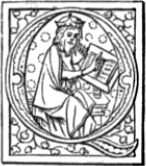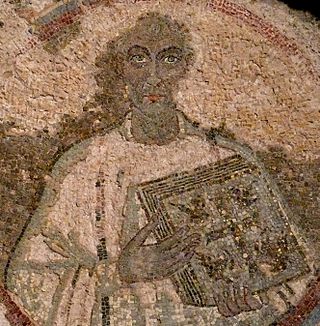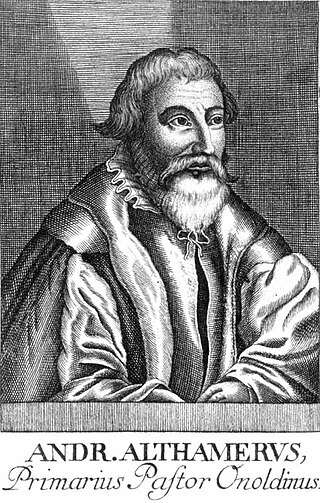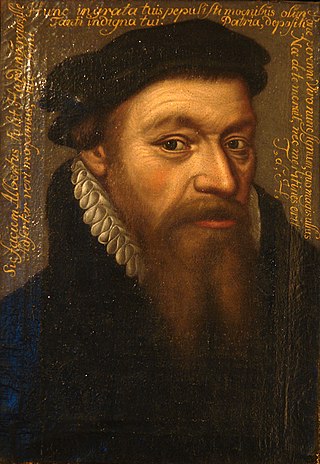Related Research Articles
Christian Hermann Weisse was a German Protestant religious philosopher and professor of philosophy at the University of Leipzig. He was the son of theologian Christian Ernst Weisse (1766–1832).

Giles of Rome was a medieval philosopher and Scholastic theologian and a friar of the Order of St Augustine, who was also appointed to the positions of prior general of his order and as Archbishop of Bourges. He is famed as being a logician, who produced a commentary on the Organon by Aristotle, and as the author of two important works: De ecclesiastica potestate, a major text of early-14th-century papalism, and De regimine principum, a guide book for Christian temporal leadership. Giles was styled Doctor Fundatissimus by Pope Benedict XIV.
Modernism in the Catholic Church describes attempts to reconcile Catholicism with modern culture, specifically an understanding of the Bible and Sacred Tradition in light of the historical-critical method and new philosophical and political developments of the late 19th and early 20th centuries.

Raoul de Houdenc was the French author of the Arthurian romance Meraugis de Portlesguez and possibly La Vengeance Raguidel. Modern scholarship suggests he is probably to be identified with one Radulfus from Hodenc-en-Bray. Raoul de Houdenc was esteemed as a master poet in the ranks of Chrétien de Troyes by Huon de Méry.

Quodvultdeus was a fifth-century Church Father and Bishop of Carthage who was exiled to Naples. He was known to have been living in Carthage around 407 and became a deacon in 421 AD. He corresponded with Augustine of Hippo, who served as Quodvultdeus' spiritual teacher. Augustine also dedicated some of his writings to Quodvultdeus.
Karl Werner was an Austrian theologian.
Rodulfus Tortarius was a French Benedictine monk of the Abbey of Fleury-sur-Loire, and a poet writing in Latin. A very early version of the story of Amys and Amylion occurs in his work.

Bertram Otto Bardenhewer was a German Catholic patrologist. His Geschichte der altkirchlichen Literatur is a standard work, re-issued in 2008. For Bardenhewer, a patrologist was not a literary historian of the Church Fathers, but a historian of dogmatic definitions.

Andreas Althamer was a German humanist and Lutheran reformer. He was born in Brenz. He studied at the universities of Leipzig and Tübingen. After completing his studies, he became a schoolteacher in Halle (Saale), Schwäbisch Hall and Reutlingen. In 1524, he was a priest in Schwäbisch Gmünd, where he tried to introduce the Reformation. He met with resistance from the Gmünder Council.

Matthäus Zell was a Lutheran pastor and an early Protestant reformer based in Strasbourg. He joined the Reformation as early as 1521.

Jakob Beurlin was a German Lutheran theologian and Protestant Reformer of the Duchy of Württemberg.
Johannes Christoph Andreas Zahn was a German theologian and musicologist best known for his opus Die Melodien der deutschen evangelischen Kirchenlieder, a critical anthology of almost 9,000 hymn melodies developed and used in German Lutheran churches.
Heinrich Gustav Bassermann was a German Lutheran theologian born in Frankfurt am Main.

Pierre Batiffol – was a French Catholic priest and prominent theologian, specialising in Church history. He had also a particular interest in the history of dogma.

Michael Buchberger was a Roman Catholic priest, notable as the seventy-fourth bishop of Regensburg since the diocese's foundation in 739.

Albert Hardenberg or Albertus Risaeus was a Reformed theologian and Protestant reformer, who was also active as a reformer in Cologne, Bremen and Emden.

Johann Christoph "Jan" Assmann was a German Egyptologist, cultural historian, and religion scholar.
Michael Schmaus was a German Roman Catholic theologian specializing in dogmatics.
Ulrich L. Lehner is the Warren Foundation Professor of Theology at the University of Notre Dame. He is a trained theologian and historian.
Raoul d'Avranches (Radulfus) was a bishop of Bayeux at the end of the 10th century and the beginning of the 11th century.
References
- Johannes Gründel, Die Lehre des Radulfus Ardens von den Verstandestugenden auf dem Hintergund seinen Seelenlehre, Munich et al.: Schöningh, 1976, (=Veröffentlichungen des Grabmann-Institutes zur Erforschung der mittelalterlichen Theologie und Philosophie; N.F., vol. 27 Münchener Universitäts-Schriften, Fachbereich katholische Theologie), simultaneously Munich, Univ., Habil.-Schr., 1966. ISBN 3-506-79427-2.